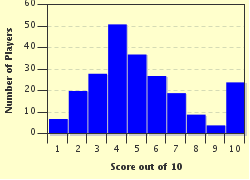Quiz Answer Key and Fun Facts
1. By recording a person's heart rate, blood pressure, and breathing rate, you are using which type of measurement of emotional state?
2. If a person has damage to the right hemisphere of the brain, which of the following will increase?
3. What test can be used to measure how sensitive a group of subjects is to nonverbal cues?
4. What part of your brain is not directly involved in emotion?
5. Using the adaptation theory of happiness, when is a person happiest?
6. If a person believes that happiness is achieved when you are so involved that you are not aware of it, what perspective would this person subscribe to?
7. Which characteristic best describes a type B personality?
8. If you are being treated for stress by being hooked up to electronic recording devices that tells you when you are changing your internal physiological processes, what is this technique called?
9. What theory states that patterns of physiological change produce emotion?
10. When are polygraphs most used?
Source: Author
trevor1968
This quiz was reviewed by FunTrivia editor
crisw before going online.
Any errors found in FunTrivia content are routinely corrected through our feedback system.

